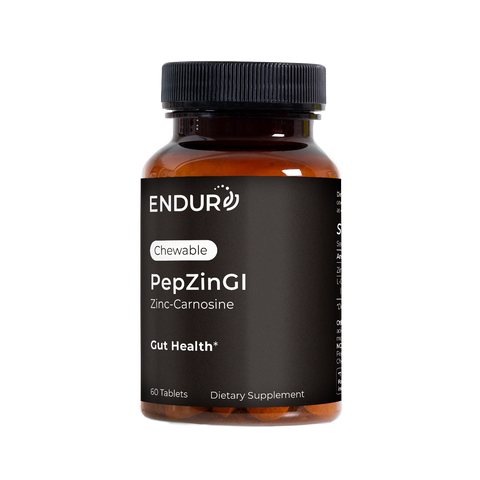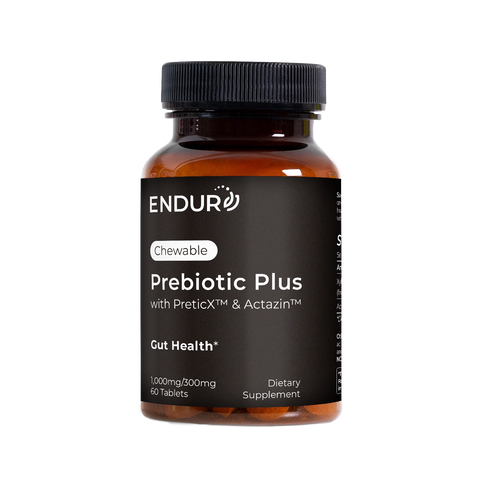Pre and Probiotics: Science-Backed Benefits and Practical Gut Health Strategies
The conversation around gut health has evolved from trendy wellness talk to legitimate scientific discourse. Today, we understand that a thriving gut microbiome serves as the foundation for optimal health, directly impacting immune function, metabolic efficiency, mood regulation, and energy production. For health-conscious adults committed to peak performance and healthy aging, prioritizing digestive wellness isn't optional—it's essential.
This comprehensive guide explores the latest research on gut health and provides evidence-based strategies for optimizing your microbiome through targeted nutrition and supplementation.

The Gut Microbiome: Your Internal Ecosystem
Within your digestive system lives a complex community of trillions of microorganisms—bacteria, yeasts, and other microbes that collectively form your gut microbiome. This microscopic ecosystem performs vital functions including nutrient breakdown, vitamin synthesis, immune system training, and gut barrier maintenance.
When properly balanced, your microbiome supports efficient digestion, robust immunity, and optimal wellness. However, factors like stress, poor diet, environmental toxins, and other factors can disrupt this delicate balance, which can impact digestive function, immune health, and the body’s normal inflammatory response.
Probiotics: Introducing Beneficial Microbes
Probiotics are live microorganisms that, when consumed in therapeutic amounts, restore and enhance gut flora balance. These beneficial bacteria and yeasts naturally occur in fermented foods such as yogurt, kefir, kimchi, sauerkraut, and aged cheeses, though they're also available as supplements.
Science-Backed Benefits of Probiotics:
Digestive Support: Probiotics improve digestion efficiency and reduce uncomfortable bloating by optimizing the breakdown of nutrients and supporting regular bowel movements.
Enhanced Nutrient Absorption: By maintaining optimal gut pH and supporting intestinal wall integrity, probiotics facilitate better absorption of vitamins, minerals, and other essential nutrients.
Immune System Fortification: With approximately 70% of immune tissue located in the gut, probiotics play a crucial role in training immune cells and maintaining appropriate inflammatory responses.
Healthy Inflammatory Response: Specific probiotic strains help modulate the body’s inflammation mechanisms, helping to maintain a normal inflammatory response.
Microbiome Support: Particularly important after disruptions due to diet, stress or other factors, probiotics help replenish beneficial bacteria and restore ecological balance.
Research highlights specific strains like Lactobacillus acidophilus and Bifidobacterium longum for their ability to support immune health, help strengthen gut barrier function and even help maintain blood cholesterol and blood sugar in the normal range.
Prebiotics: Nourishment for Your Microbiome
While probiotics introduce beneficial bacteria, prebiotics serve as their food source. These specialized, non-digestible fibers selectively nourish beneficial microbes, encouraging their growth and activity throughout your digestive system.
Prime Prebiotic Sources:
Fruits: Kiwifruit, bananas, apples, berries Vegetables: Garlic, onions, asparagus, carrots, sweet potatoes
Whole Grains: Oats, barley, flaxseed, wheat bran Legumes and Nuts: Various beans, lentils, almonds, walnuts
Health Benefits of Prebiotics:
Metabolic Support: Prebiotics help maintain healthy digestion and support healthy metabolic function by promoting beneficial bacterial growth.
Bone Health Support: Prebiotics help enhance calcium absorption to promote optimal bone density and skeletal health.
Blood Sugar Regulation: Prebiotic fibers promote blood glucose balance and insulin sensitivity.
Cardiovascular Benefits: Regular prebiotic consumption helps maintain healthy cholesterol metabolism and supports the body’s natural inflammatory response.
Immune Function: By nourishing beneficial gut bacteria, prebiotics indirectly support normal immune cell function and contribute to overall immune health.
Weight Management: Prebiotics promote satiety and support healthy weight maintenance efforts by positively influencing gut hormone activity.
Additionally, prebiotics stimulate the production of short-chain fatty acids (SCFAs), which help maintain gut lining integrity, promote a healthy inflammatory response, and support overall intestinal health.
Special Focus: Kiwifruit for Digestive Health
 Kiwifruit deserves special recognition for its exceptional prebiotic properties. Research shows that kiwifruit fiber holds 50% more water than psyllium, which helps create softer, more manageable stools. Its fermentable prebiotic fiber supports microbiome diversity, while actinidin—a unique proteolytic enzyme found only in kiwifruit—may enhance its natural laxative effects.
Kiwifruit deserves special recognition for its exceptional prebiotic properties. Research shows that kiwifruit fiber holds 50% more water than psyllium, which helps create softer, more manageable stools. Its fermentable prebiotic fiber supports microbiome diversity, while actinidin—a unique proteolytic enzyme found only in kiwifruit—may enhance its natural laxative effects.
For enhanced supplementation, products like Endur™ Prebiotic Plus combine clinically effective amounts of Actazin™ green kiwifruit powder (600 mg per daily serving) with PreticX™ xylooligosaccharides to provide gentle, non-stimulant constipation relief while promoting beneficial bacterial growth.
The Prebiotic Power Cocktail: A Daily Gut Health Elixir
One delicious way to support your gut microbiome is through a daily prebiotic cocktail that combines multiple gut-supporting ingredients. This refreshing drink delivers prebiotics, antioxidants, and beneficial acids to support digestive wellness in a single, convenient serving.

Ultimate Gut Health Cocktail Recipe
Ingredients:
-
1 cup filtered water
-
2 tablespoons raw, unfiltered apple cider vinegar (with the mother)
-
1 tablespoon fresh lemon juice
-
1 teaspoon fresh grated ginger (or 1/4 teaspoon ginger powder)
-
1 teaspoon raw honey
-
Pinch of sea salt
Instructions:
-
Combine all ingredients in a glass and stir thoroughly
-
Let sit for 2-3 minutes to allow flavors to meld
-
Drink 15-30 minutes before meals for optimal digestive support
-
Start with smaller amounts and gradually increase to assess tolerance
Why This Combination Works:
Apple Cider Vinegar: Contains acetic acid, which helps optimize stomach pH for better protein digestion and nutrient absorption.
Lemon Juice: Provides vitamin C and citrus bioflavonoids that support immune function. The citric acid stimulates digestive enzyme production.
Ginger: Offers powerful antioxidant compounds and supports digestive motility, helping prevent bloating and promoting regular elimination.
Raw Honey: When included, provides oligosaccharides that serve as gentle prebiotics while adding natural antimicrobial properties.
This cocktail can be consumed daily, preferably on an empty stomach, to maximize its prebiotic and digestive benefits.
Oregano Oil: Nature's Antioxidant Powerhouse
While probiotics and prebiotics focus on supporting beneficial bacteria, sometimes the gut may also benefit from targeted support to help maintain a healthy microbial balance. Oregano oil, derived from the Mediterranean herb Origanum vulgare, provides natural compounds that help support the body’s natural defenses and maintain microbial balance in the digestive tract.

The Science Behind Oregano Oil:
Oregano oil contains carvacrol and thymol—two bioactive compounds with powerful antioxidant capacity. Research shows these compounds may help support the body’s natural defenses against foreign invaders while maintaining a healthy microbial balance in the gut.
Gut Health Benefits of Oregano Oil:
Gut Microbiome Balance: Helps support your body’s natural defenses and keep the bacteria in your gut healthy and balanced.
Healthy Inflammatory Response: Helps soothe the digestive tract and supports overall digestive health.
Immune Support: Provides antioxidant support to help protect immune cells from damage caused by free radicals and oxidative stress.
Digestive Comfort: May help soothe occasional digestive upset, such as gas or bloating.
Safe Usage Guidelines: Oregano oil is highly concentrated and should be used carefully. Look for products standardized to contain at least 70% carvacrol. Typical dosing ranges from 100-200mg daily, taken with meals. Always dilute oregano oil and consider starting with lower doses to assess tolerance.
Important Note: Oregano oil should be used strategically rather than continuously. Consider cycling its use (2-4 weeks on, 1-2 weeks off)
Synergistic Approach: Combining Prebiotics and Probiotics
The most effective gut health strategy combines prebiotics and probiotics—an approach known as Synbiotics. This combination ensures that beneficial bacteria not only reach your gut but also have the nutrients they need to thrive and establish lasting colonies.
Think of this relationship as gardening: probiotics plant the seeds (beneficial bacteria) while prebiotics provide the soil nutrients (fiber) necessary for growth. Without adequate prebiotic support, even the highest-quality probiotics may struggle to colonize effectively.
Zinc-Carnosine: Advanced Gut Barrier Support
Zinc-Carnosine represents an innovative approach to gut health, combining the mineral zinc with the dipeptide carnosine. This unique compound was specifically developed to support gastrointestinal integrity and has gained attention for its ability to strengthen the gut barrier.
Benefits of Zinc-Carnosine:
Gut Barrier Strengthening: Supports the integrity of the intestinal lining, helping prevent unwanted substances from crossing into systemic circulation.
Mucosal Healing: Promotes the body’s natural processes for maintaining and renewing the integrity of the gut lining, particularly beneficial for those with digestive sensitivities.
Digestive Comfort: Helps fortify the protective mucous membrane lining the stomach and intestines.
Recovery Enhancement: May accelerate healing from exercise-induced gastrointestinal irritation or stress-related digestive issues.
This supplement is particularly valuable for individuals experiencing digestive discomfort, athletes subjecting their bodies to intense physical stress, or anyone seeking to optimize gut barrier function.
Actionable Strategies for Optimal Gut Health
1. Embrace Dietary Diversity
Consume a wide variety of plant-based foods to provide diverse prebiotic fibers and support microbiome diversity. An easy way to increase variety over time is to add a few new plant foods to your meals each week. Think fruits, vegetables, whole grains, nuts, seeds, and legumes.
2. Prioritize Prebiotic Intake Daily
Incorporate prebiotic-rich foods into your daily menu. Start your day with oats and banana, include garlic and onions in savory dishes, or snack on apples and berries throughout the day.
3. Include Probiotic Foods and Strategic Supplementation
Regular consumption of fermented foods provides natural probiotics. For supplementation, choose multi-strain products with clinically studied organisms like certain Lactobacillus and Bifidobacterium strains.
4. Consider Synbiotic Formulations
Products combining prebiotics and probiotics in optimal ratios can be particularly effective for busy individuals or those who want targeted support for gut health.
5. Implement Strategic Antimicrobial Support
When appropriate, use oregano oil or other natural antioxidants to help fortify gut health.
6. Support Gut Barrier Function
Consider Zinc-Carnosine supplementation if you experience digestive sensitivity, engage in intense physical activity, or want to optimize intestinal barrier integrity. Choose a research-backed form such as PepZinGI® found in Endur™ Zinc-Carnosine. It’s backed by decades of clinical studies showing it helps fortify the protective mucous membrane lining the stomach and intestines.*
7. Maintain Foundational Health Practices
Stay adequately hydrated, manage stress through mindfulness and quality sleep, and limit processed foods that can disrupt microbial balance.
Sample Gut-Supportive Day
Morning:
-
Prebiotic cocktail (apple cider vinegar, lemon, ginger)
-
Oatmeal with banana, berries, and ground flaxseed
Mid-Morning:
-
Green tea with a small apple
Lunch:
-
Large salad with asparagus, onions, and sauerkraut
-
Quinoa bowl with roasted sweet potatoes
Afternoon:
-
Greek yogurt with granola and honey
Dinner:
-
Grilled salmon with garlic-roasted vegetables
-
Side of fermented vegetables
Supplements (as needed):
-
Multi-strain probiotic
-
Zinc-Carnosine
-
Oregano oil
References:
Catanese L. Prebiotics: Understanding their role in gut health. Harvard Health Publishing. May 15, 2024. https://www.health.harvard.edu/nutrition/prebiotics-understanding-their-role-in-gut-health
Davani-Davari D, Negahdaripour M, Karimzadeh I, et al. Prebiotics: definition, types, sources, mechanisms, and clinical applications. Foods. 2019;8(3):92.
Graham E, McKeen S, Lewis ED, et al. Actazin® green kiwifruit powder consumption at 600 mg per day for 28 days improves stool form and relieves occasional constipation in healthy individuals: a randomized controlled trial. Bioact Carbohydr Diet Fibre. 2024;32:100436.
Nurzyńska-Wierdak R, Walasek-Janusz M. Chemical composition, biological activity, and potential uses of oregano (Origanum vulgare L.) and oregano essential oil. Pharmaceuticals. 2025;18(2):267.
Conclusion: Your Gut Health Journey Starts Now
A thriving gut microbiome forms the cornerstone of optimal health, influencing everything from daily energy levels to long-term disease resistance. By strategically combining prebiotics, probiotics, targeted support like oregano oil, and specialized compounds like Zinc-Carnosine, you can create a comprehensive gut health protocol tailored to your individual needs.
Remember maintaining gut health is more about consistency than perfection. Start by incorporating the prebiotic cocktail into your morning routine, gradually adding more fermented foods, and considering strategic supplementation based on your specific health goals and challenges.
Your gut health journey is ultimately about creating sustainable habits that support your body's natural healing and optimization processes. Consult with a qualified healthcare provider before beginning any new supplement regimen, especially if you have any known or suspected health conditions, take medication, or are pregnant, planning to become pregnant, or nursing.
Nourish your gut, watch your health transform.
*These statements have not been evaluated by the Food and Drug Administration. This product is not intended to diagnose, treat, cure or prevent any disease.



